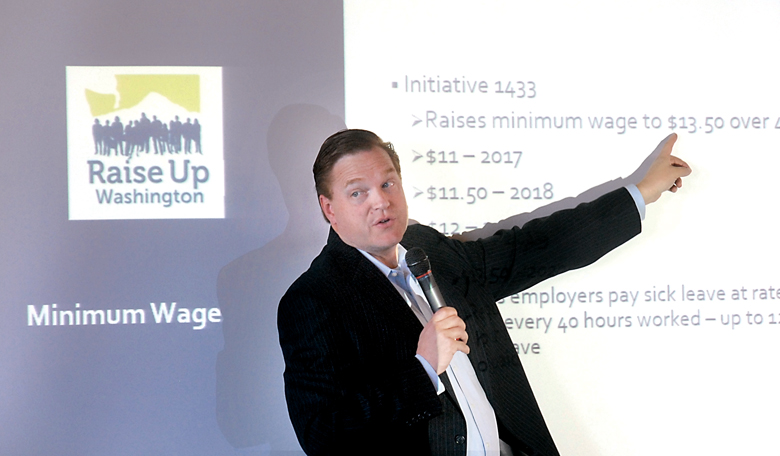PORT ANGELES — Unemployment rates outside the growth nexus of King and Snohomish counties are substantially higher than the rest of Washington state, Association of Washington Business President Kris Johnson told a Port Angeles group Wednesday.
The top concern among employers like those in far smaller Clallam and Jefferson counties is their continued unsuccessful search for educated, skilled workers, Johnson told about 40 Port Angeles Regional Chamber of Commerce members and guests at a networking luncheon at the Red Lion Hotel.
That’s what Johnson said he gleaned from about 20 recent Association of Washington Business (AWB) outreach meetings with business groups statewide.
Those meetings included a get-together in June in Port Angeles that included entrepreneurs from throughout the North Olympic Peninsula, including the Forks area, according to Johnson.
Johnson said second on the business communities’ list of concerns was the quality and cost of employee health care, followed by the regulatory environment at the local and state levels.
His presentation included a map showing May unemployment among Peninsula residents — not including those whose benefits have run out or who have stopped looking for work — at 7.8 percent in Clallam County and 7.1 in Jefferson County.
That compared to 4.4 percent in King County and 4.8 percent in Snohomish County.
Johnson said that in most of the state’s 37 other counties, the farther away from Seattle the place is, the worse the unemployment picture gets.
“The health of the economy is struggling,” Johnson said.
According to information provided Wednesday by Johnson, job growth from October 2014 to October 2015 increased by 2.4 percent — an addition of 540 jobs — in Clallam County and 3.5 percent — an addition of 280 jobs — in Jefferson County.
During that same period, job growth increased 3 percent in King and Snohomish counties.
State employment security department officials release June unemployment numbers later this month.
Marc Abshire, the chamber of commerce executive director, said after the meeting that Peninsula College plays an important role in training people for skilled jobs.
He said many of those jobs are now going unfilled.
“This is a systemic challenge,” he said. “It’s not that employers don’t want to fill them.”
Johnson’s 35-minute presentation was part rallying cry to unite behind the AWB as an organization that represents small-business interests and part warning call over legislative initiatives they should be concerned about as the 2017 legislative session draws near.
Atop state lawmakers’ list of concerns when they convene in January will be fulfilling the education funding mandate of the state Supreme Court’s McCleary decision, a landmark ruling spurred by Chimacum resident Stephanie McCleary’s lawsuit.
Johnson said lawmakers must produce $3 billion to add to the $4 billion they’ve already set aside for K-12 basic education programs that must come out of state, not local, coffers.
He also lamented the potential impact of statewide initiative measures proposed for the Nov. 8 ballot.
Initiative 1433 would raise the $9.47 minimum wage in annual stages beginning in 2017 to $13.50 by 2020 and would require employers to offer sick leave.
Behind the campaign is the group Raise Up Washington, which last week submitted 360,000 signatures; 246,372 verified signatures are required to get the measure on the ballot.
Gary Chandler, AWB’s vice president of government affairs, who was at Wednesday’s luncheon, predicted at the AWB’s June 28 outreach meeting with the chamber of commerce that voters will approve the minimum wage increase.
Johnson also said voters will weigh in on climate change Initiative 732.
It places a $25-per-metric-ton tax on carbon dioxide emissions and fossil fuels and reduces the state sales tax by 1 percentage point.
“Ultimately, it will hit all of us,” Johnson said of the tax increase.
Johnson asserted that Washington is already the country’s fourth “greenest” state and already produces about three-quarters of its electricity from nonpolluting hydroelectric power.
Businesses are already burdened by high taxation, Johnson said.
He showed pie charts based on statistics from the Washington Research Council.
According to the group, Washington businesses pay 58 percent of local and state tax collections compared to 38 percent in Oregon, which has an income tax and no sales tax, and 45 percent in Idaho, which also has an income tax.
Johnson urged local businesses to join with organizations to urge the passage of legislation beneficial to the economy.
He said when local leaders appear before state legislators, lawmakers take notice.
Abshire said after the meeting that his takeaway from the luncheon was that 2017 will be important year for business in the state Legislature.
“There seems to be more things on the table that will impact businesses than we’ve seen in recent years,” Abshire said.
Borrowing an image that Johnson drew from legislative hearings, Abshire added: “If a business owner shows up in Olympia, [lawmakers] stop looking at their laptops and listen to you.”
________
Senior Staff Writer Paul Gottlieb can be reached at 360-452-2345, ext. 55650, or at pgottlieb@peninsuladailynews.com.
